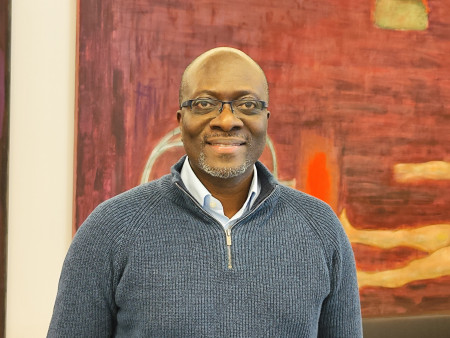
Prf Eric Addae-Kyeremeh
Head Of School, Education, Childhood, Youth And Sport
School of Education, Childhood, Youth & Sport
Biography
I am a Professor of Educational Leadership and Development and have served as Head of School since 2021. With over 20 years of professional experience in education, I have dedicated my career to fostering innovation, equity, and excellence in teaching, research, and leadership development. My journey began with a passion for transforming lives in the Further Education (FE) sector in England, where I led subject areas including Science and Mathematics, Information and Communication Technology, and Business, Administration, and Law.
Since joining The Open University (OU) in 2011, I have held leadership positions, including Associate Programme Director, Associate Head of School, and currently, Head of School and Academic Lead for Academic Promotions. In these capacities, I have helped shape organisational culture, champion Equality, Diversity, and Inclusion (EDI), and driven student success. My leadership contributions extend to mentoring future leaders, spearheading innovative pedagogy, and integrating digital technologies into learning experiences.
My research focusses on educational leadership, evidence-based practice, and teacher professional development, with a strong emphasis on global collaboration. I have co-authored CPD courses, published influential reports, book chapters, and journal articles, and mentored emerging scholars and professionals. My work bridges the gap between research, policy, and practice, prioritising real-world impact, particularly in Sub-Saharan Africa and South Asia.
As speaker and advisor, I have contributed to global dialogues, including multi-stakeholder engagements in Ghana, Nigeria, India, and the UK. I have also advised governments, led multimillion-pound projects, and contributed to educational reform initiatives in Bangladesh, England, Ghana, India, Nigeria, Uganda, and Wales.
My principal areas of interest for doctoral research supervision include:
Leadership and management of education
Learning and development of education practitioners
Professional and practitioner networks and how they contribute to organisational development
Educational change
Education policy
Professional recognition
Senior Fellow, Advance HE (formerly Higher Education Academy)
Fellow and Chartered Manager - Chartered Management Institute (CMI)
Fellow and Chartered IT Professional – BCS, The Chartered Institute of IT
Membership or offices held in learned societies and professional bodies
Member, Deans Forum, European Association of Distance Teaching Universities
Executive Committee Member, Universities' Council for the Education of Teachers
Management Forum Member, Universities' Council for the Education of Teachers
Member, British Educational Leadership Management and Administration Society
Member, Commonwealth Council for Educational Administration and Management
Academic editorial work
Editorial Advisory Board Member, Open University Press
Subject Expert Reviewer, IGI Global
Subject Matter Expert, Sage Campus
Reviewer, International Journal of Gender Science and Technology
Reviewer, Open Learning: The Journal of Open and Distance Learning
Reviewer, Management in Education
Specialist Reviewer, Routledge Education Publications
Reviewer, European Journal of Open, Distance and E-Learning
Recent international roles
Expert Mentor in Digital Education (2022 – date), European Digital Education Hub
Esteemed Member (2023 – date), Body of Practitioners Knowledge (BOPK), Adhyayan Foundation,India
Academic Advisor to the University of Ghana (2022 – 2024) on the revision of their Teaching and Learning Policy
Projects
A European Inclusion Reference Framework for Inclusion, Diversity and Equity
The IncluDE project creates an Inclusion Reference Framework for higher education institutions along with practice-oriented instruments to assess and enhance inclusion policies and practices. This enables leaders, intermediary educational support services, teaching staff, and students to improve inclusion across all levels - course, curriculum, and institutional. In all successive phases of the project, institutional partners develop synergies, will leverage their expertise and experience. The project aligns with the concepts of inclusion, equity, diversity and inclusion challenges as defined by the European Commission, reinforcing the shared European language and approach. Inclusion challenges encompass disabilities, health problems, educations system barriers, cultural differences, social barriers, economic barriers, discrimination and geographical barriers (Erasmus+). These challenges are encountered by individual or groups of students throughout their entire academic journey, from pre-access preparation, fair admission, personalised learning and study progression, equitable assessments and examinations, and adequate preparation for their future careers. The Inclusion Reference Framework includes indicators rooted in principles and recommendations derived from research literature, international and national policies, existing institutional guidelines, and best practices. It offers a diagnostic Inclusion Evaluation Instrument, based on these indicators, that allows institutions to assess their current status, identify what should be done next, and determine what is realistically achievable within their institution. It also includes an Inclusion Monitor that helps institutional actors in structuring discussions and action planning at all levels. All is integrated in the Inclusive Higher Education Resources Panel, and the IncluDE CPD course, which provides stakeholders with tools and educational resources for managing and enhancing inclusion.
Publications
Book Chapter
New National Teacher Education Curriculum in Ghana: Successes and Challenges (2024)
Digital Artefact
Unlocking literacy: The power of parents and cultural heritage (2025)
Journal Article
What makes useful evidence for educational leadership practice? An interview (2018)
Other
Afrocentric Pedagogical Leadership: A toolkit for educators in Ghana (2026)
Partners in Play Baseline Evaluation Report (2022)
Bringing a teacher’s learning and development, back to school (2021)
Preprint / Working Paper
Play-based Learning in Ghana - The Evidence and Policy Implications (2021)
Presentation / Conference Contribution
Opportunities and challenges of tertiary level ICT-based science education in Ghana (2023)
ICT-based teaching and learning in Ghana: OpenSTEM Africa (2021)
Remodelling STEM education using onscreen tools to teach practical science in Ghana (2021)
OpenSTEM Africa: Strengthening science education in Ghana (2020)
Professional development spaces: an exploratory study of headteachers perspectives in Ghana (2014)